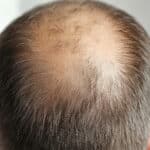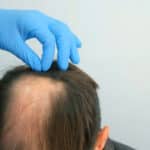What to Expect After Laser Hair Therapy
After undergoing laser hair therapy, patients can anticipate a gradual improvement in the health and appearance of their hair. Initially, one might not observe immediate changes, as the therapy works to stimulate hair follicles at a cellular level, a process that unfolds over time. Within 3 to 6 months, many individuals start to notice increased hair density, a reduction in hair thinning, and a healthier scalp condition. The treatment is designed to enhance blood flow to the scalp, encouraging the growth of stronger, thicker hair strands.
*Individual results may vary.
Frequently Asked Questions About Laser Hair Therapy
What conditions or issues can laser hair therapy treat?
Laser hair therapy is recognized as an effective hair loss treatment, particularly beneficial for individuals experiencing thinning hair and those managing alopecia. By utilizing low-level laser technology, this therapy stimulates hair follicles, promoting regrowth and enhancing the density of hair. It is a non-invasive solution designed to address the underlying issues contributing to hair loss, offering a targeted approach to hair restoration.
How long does it take to see results from laser hair therapy?
The timeline to observe tangible results from laser hair therapy varies, depending on individual response to the treatment. Typically, patients may start to notice improvements in hair thickness and scalp health within 3 to 6 months of consistent therapy sessions. It is important to adhere to the prescribed treatment plan to achieve optimal outcomes, as results accumulate over time.
Is laser hair therapy safe, and are there any side effects?
Laser hair therapy is widely regarded as a safe option for hair loss treatment, with a low risk of side effects. The procedure is non-invasive, utilizing therapeutic low-level lasers that do not cause harm to the skin or hair follicles. While most patients do not experience adverse effects, a small number may report minimal scalp irritation, which typically resolves quickly. It is crucial to consult with a specialist to understand any potential risks based on individual health profiles.
Who is an ideal candidate for laser hair therapy?
Ideal candidates for laser hair therapy are individuals experiencing early to moderate stages of hair loss. This treatment is most effective for those seeking to enhance hair density, manage thinning hair, or slow the progression of hair loss.
Can laser hair therapy be used in combination with other hair loss treatments?
Yes, laser hair therapy can be integrated into a holistic approach to hair loss management, often used in conjunction with other treatments such as topical solutions, oral medications, or even surgical options like hair transplantation. This combined treatment strategy can synergize effects, potentially leading to more comprehensive and lasting results. Consulting with a hair restoration expert can help tailor a multi-faceted treatment plan that addresses individual needs and goals.
How many laser hair therapy sessions will I need?
The number of laser hair therapy sessions required varies based on individual treatment goals and the extent of hair loss. Generally, a treatment plan may involve sessions 2-3 times a week for several months, followed by a maintenance schedule to sustain results. A personalized treatment plan will be developed during the consultation, outlining the expected number of sessions to achieve desired outcomes.
What is the difference between laser hair therapy and other hair loss treatments?
Laser hair therapy distinguishes itself from other hair loss treatments through its non-invasive nature and mechanism of action. Unlike surgical options that require recovery time, laser therapy offers a pain-free alternative with no downtime. Compared to pharmaceutical treatments, it carries a lower risk of side effects. Laser therapy works by stimulating cellular activity and blood flow to the scalp, a contrast to treatments that may involve hormone modulation or transplantation procedures.
What kind of maintenance or follow-up is required after laser hair therapy?
Following the initial treatment phase, maintenance sessions may be recommended to sustain the health and density of the hair. The frequency of these follow-up sessions will depend on individual response to the therapy and long-term hair restoration goals. Regular consultations with a hair restoration specialist will ensure the maintenance plan remains aligned with the patient’s needs, adjusting as necessary to preserve treatment gains.
Related Posts
How Many Grafts Do I Need for My Hair Transplant? February 14, 2025
If you’re considering a hair transplant, one of the first questions you’ll likely ask is, ...
Can Laser Hair Therapy Prevent Future Hair Loss? November 27, 2024
Hair loss can be a frustrating experience for many, whether it’s thinning hair or more ...
How FUE Hair Transplant Can Help Combat Male and Female Pattern Baldness October 22, 2024
Experiencing hair loss can be frustrating, whether you’re a man or woman. Male and female ...